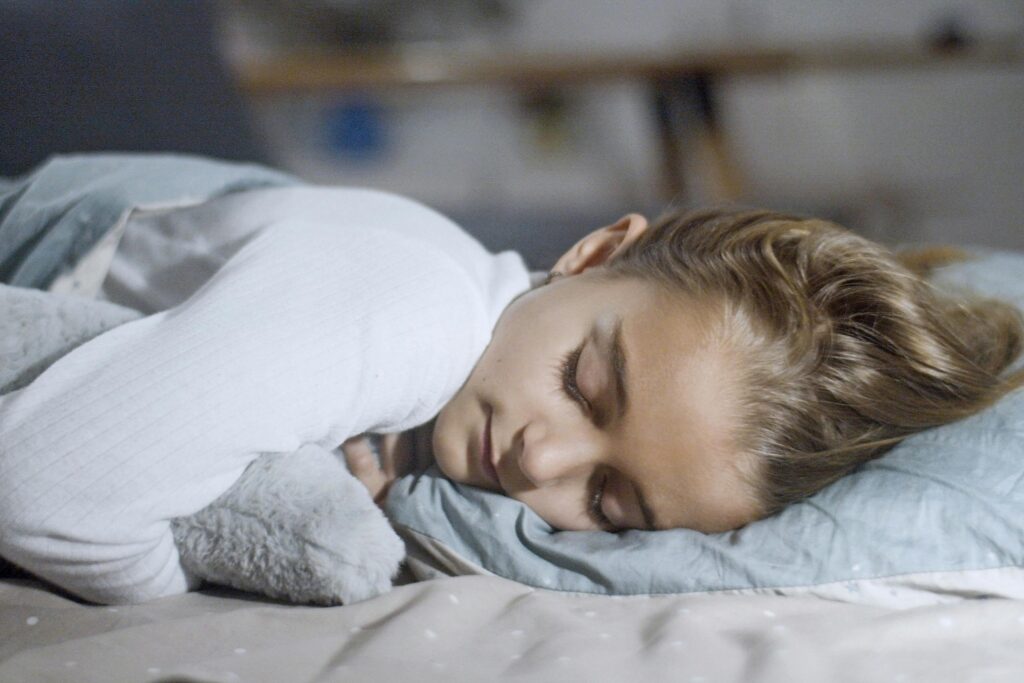Autism and Sleep
October 11, 2024
For families with children with autism spectrum disorder (ASD), sleep issues are a common and significant concern. Research shows that 50-80% of children with autism experience some degree of difficulty with sleep.

When a child with autism doesn’t sleep well, the effects go beyond just sleep and may affect the child during the day. For some children lack of sleep can result in:
- Problems with waking up in the morning
- Daytime sleepiness or overactivity
- Difficulties focusing on school or therapy
- Tantrums
- Being less engaged with parents and peers
- Being more cranky/irritable
If your little one is struggling with any of these sleep challenges, you are not alone! Sleep problems in children with ASD are very treatable. Let’s first look at what some of the common challenges are around sleep. Next, we’ll look at some of the contributing factors to sleep difficulties and finally, some strategies.
If you find yourself needing more support for your family around sleep, please reach out.
Common Sleep Challenges in Children with Autism
- Difficulty Falling Asleep: Many children with autism have trouble falling asleep due to heightened anxiety, sensory sensitivities, or difficulty calming their minds. The ability to “wind down” at the end of the day may not come as naturally. Additionally, they may be hyper-focused on certain activities or thoughts at bedtime, which can further delay sleep onset.
- Frequent Night Wakings: Some children with autism wake frequently during the night and struggle to go back to sleep. This could be due to sensory issues such as changes in temperature, light, or sound that disrupt their sleep environment. Others may wake up because they haven’t achieved deep, restorative sleep.
- Irregular Sleep-Wake Cycles: Children on the autism spectrum may have trouble establishing consistent sleep-wake cycles. Their internal clocks, or circadian rhythms, can be disrupted causing inconsistent bedtimes and wake times. Some children may go to bed very late and wake up early, while others have difficulty adhering to a structured schedule.
- Restlessness and Poor Sleep Quality: Even if children with autism sleep through the night, the quality of their sleep may be poor. Many experience restless sleep, tossing and turning, and may wake up feeling fatigued and irritable. This can lead to difficulties with attention and behavior throughout the day.
Contributing Factors to Sleep Challenges
Several factors contribute to these sleep challenges in children with autism:
- Sensory Sensitivities: Many children with autism are highly sensitive to their environment. Noise, light, textures, and temperature can all play a role in disturbing their sleep. Even the texture of bedding or the temperature of a room may be problematic.
- Anxiety and Hyperarousal: Children on the spectrum often experience anxiety and heightened states of arousal. These feelings can make it difficult for them to relax and transition into sleep. Nighttime worries or over-stimulation from the day can further disrupt sleep.
- Medical Conditions: Some children with autism also have co-occurring conditions that can contribute to sleep problems, such as gastrointestinal issues, seizures, or sleep apnea. In these cases, a medical evaluation is crucial to addressing the underlying issue.
- Melatonin Imbalance: Children with autism may have lower levels of melatonin, the hormone that regulates sleep.
Strategies to Improve Sleep in Children with Autism
- Establish a Consistent Bedtime Routine: A structured, calming bedtime routine can help signal to a child that it’s time to sleep. This could include activities such as a warm bath, reading a story, or engaging in relaxing sensory activities.
- Create a Sensory-Friendly Sleep Environment: Make sure your child’s sleep environment is tailored to their sensory needs. This may involve blackout curtains, white noise machines, or their favorite comfort items.
- Consider Melatonin Supplements: Melatonin supplements may help regulate your child’s sleep-wake cycle. I always recommend discussing this with your child’s healthcare providers before starting.
- Work with a Sleep Specialist: A pediatric sleep specialist, particularly one experienced in autism, can help assess and treat underlying sleep issues through behavioral and environmental adjustments. Contact us for a sleep assessment and personalized support.
Another great resource is the Autism Speaks Sleep Toolkit. Sierra Nevada Sleep has expertise in supporting children with autism, ADHD, and other developmental challenges. If you find yourself in need of more support, we’d love to help.